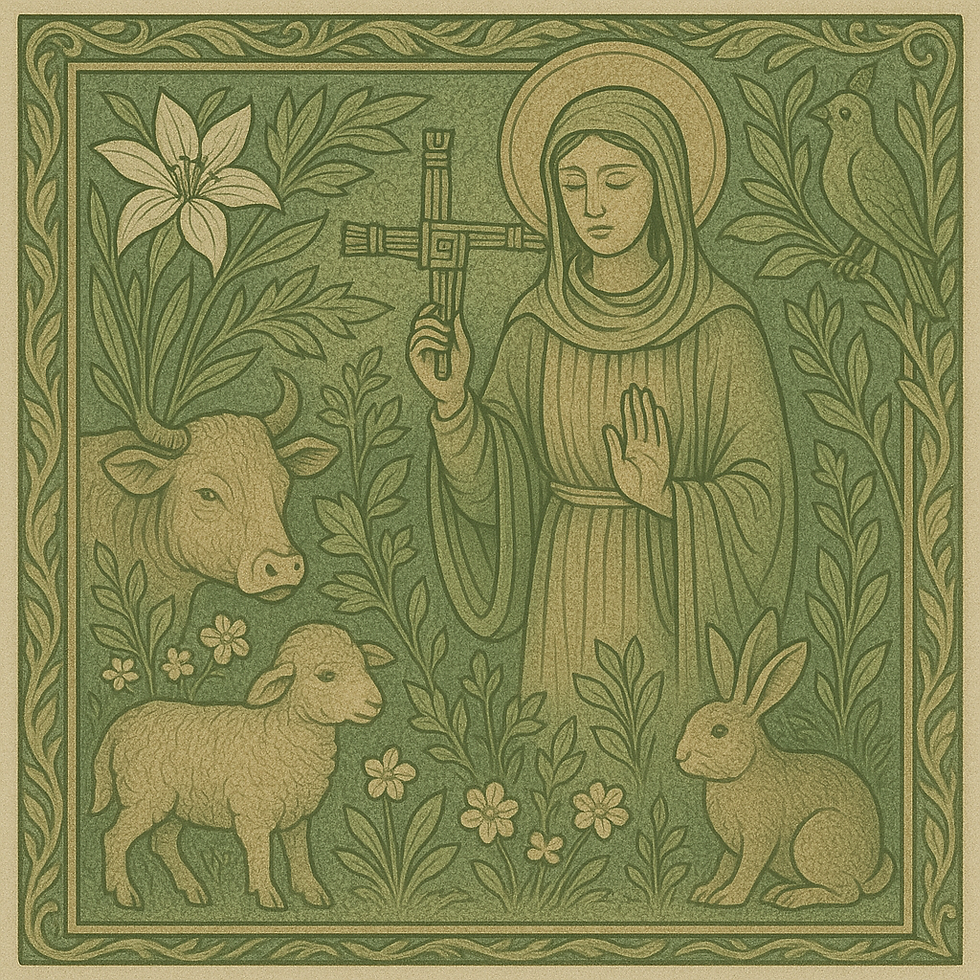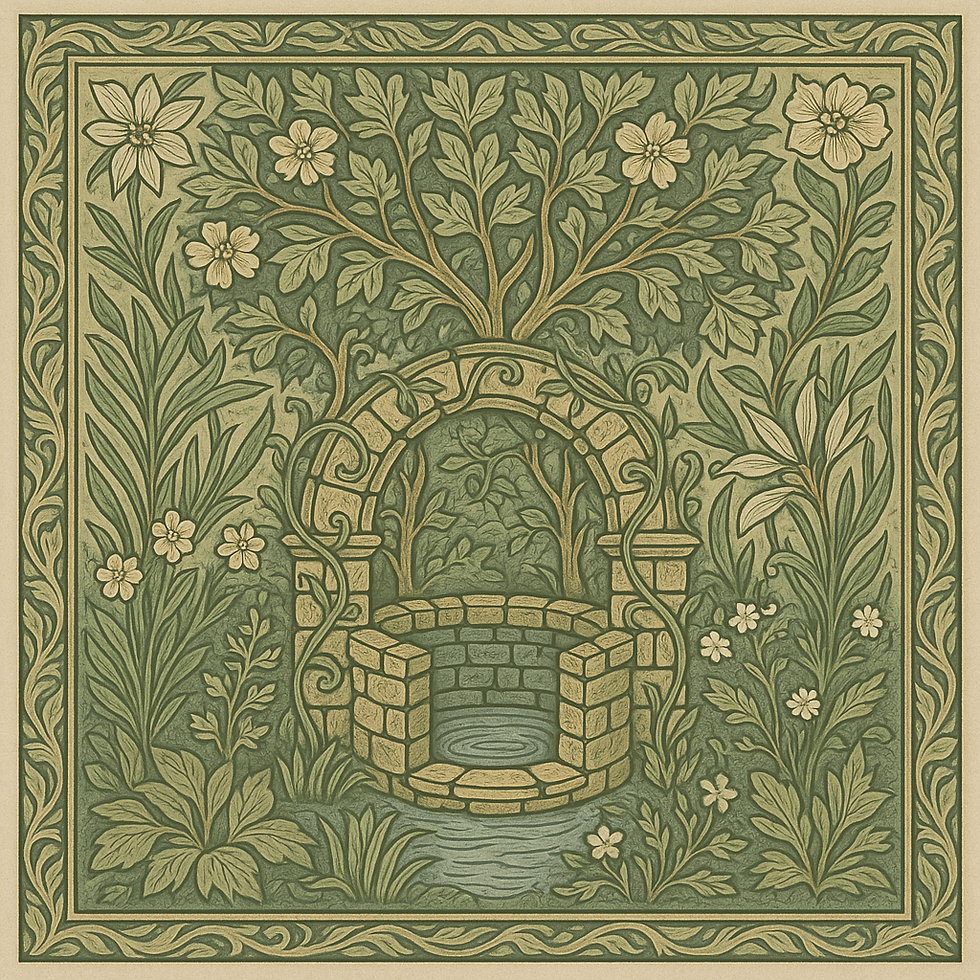Holy Wells, Healing, and Saint Brigid’s Cross: Celtic Signs of Grace
- Fiach OBroin-Molloy

- Aug 25
- 4 min read
Updated: Sep 1
Ireland’s spiritual landscape is woven with wild beauty, ancient devotion, and sacred sites that echo with centuries of prayer. Among its most enduring religious symbols are holy wells, Saint Brigid’s Cross, and the stories of healing tied to Saint Brigid of Kildare, one of Ireland’s most beloved saints. These powerful Celtic Christian traditions continue to inspire pilgrims and the faithful today. This blog post explores their meaning, history, and continued relevance, especially in a world still seeking healing of body and soul.

Who Was Saint Brigid?
Saint Brigid of Kildare (c. 451 – 525 AD) was an Irish nun, abbess, and founder of several monasteries, most notably the dual monastery of Kildare. She is often called "Mary of the Gael" and is known for her generosity, hospitality, and deep compassion for the poor and sick. As a bridge between pagan and Christian Ireland, many legends of Brigid include miraculous healings and signs that blend Celtic symbolism with Christian faith [1].
Holy Wells: Sacred Springs of Healing
Holy wells are natural springs or water sources long associated with healing and miracles in Ireland. While many existed in pre-Christian times, they were later Christianised and linked to saints such as Brigid, Patrick, and Columba. There are over 3,000 holy wells across Ireland, with Brigid having more than 15 dedicated to her name [2].

Pilgrims still visit these wells to drink or wash in the water, pray, and leave offerings such as rosary beads, ribbons, or personal tokens. Traditionally, a visit to a holy well includes walking in prayerful circles (called "rounds"), reciting the rosary, and sometimes completing a "pattern" day with Mass or blessings on the saint's feast.
Saint Brigid's Well in Kildare, located near her ancient monastic site, remains a popular destination for those seeking both spiritual and physical healing.
Miracles of Saint Brigid: Compassion and Cures
Numerous miracles are attributed to Saint Brigid during and after her life. These include:
Healing a blind nun
Multiplying food for the poor
Causing water to spring from dry ground
Healing the sick with her touch or prayers
Brigid’s miracles were often practical and rooted in her concern for others. She is also associated with the healing of animals, care for nature, and even calming the weather—reflecting her harmony with both creation and Creator [3].
Her feast day on 1 February, known as Imbolc in the Celtic calendar, celebrates the coming of spring and is seen as a time of renewal and healing.

Saint Brigid’s Cross: A Symbol of Protection
The Saint Brigid’s Cross, traditionally woven from rushes or straw, is an iconic emblem of Irish Christianity. According to legend, Brigid crafted the first cross from rushes on a dying chieftain’s floor, explaining the story of Christ to bring him peace before death [4].
The cross is typically placed in homes above doorways for protection and blessing. It is particularly popular during February and Easter seasons. Many Irish Catholics weave them as a devotional craft and display them during the year to invoke Brigid’s intercession.
It is also closely associated with healing, and in older traditions, Brigid’s Crosses were dipped in holy water and laid on the sick to bring comfort and prayerful protection.
Celtic Christianity and the Rosary
Though the rosary came into widespread Catholic use after the Celtic golden age, its meditative, repetitive nature fits beautifully within the rhythm of Celtic spirituality. Praying the rosary at holy wells has become a popular tradition, especially during feast days. The soothing cadence of Hail Marys combined with the silence of nature speaks to the contemplative heart of Irish devotion.

Many modern pilgrims use rosaries inspired by Celtic symbols, incorporating green Connemara marble, Celtic knots, and crosses into their beads. These sacred tools become more than accessories—they become companions on the spiritual journey.
Our store proudly offers handcrafted rosary beads that honour this heritage, made with natural stones and symbols that echo the faith of saints like Brigid.
How to Celebrate Saint Brigid and Holy Wells Today
To embrace this beautiful tradition in your own prayer life:
Visit a holy well if you are in Ireland or research virtual pilgrimage options online
Pray a rosary for healing on Saint Brigid’s feast day or when you feel in need of grace
Craft a Brigid’s Cross from rushes or paper with children or your parish
Create a healing altar with a candle, a Brigid cross, and your rosary
Offer prayers for the sick, especially those in your family or community
Healing Waters and Living Faith
Saint Brigid, the holy wells, and the crosses woven in her honour are enduring symbols of a living faith that heals and uplifts. In an age of anxiety and physical suffering, these signs of grace point us to God’s desire to restore us. Through the simple act of prayer, especially the rosary, we can draw close to the same wellsprings of hope that nourished the Celtic saints.
May Saint Brigid pray for us, that we too may bring comfort, healing, and joy to a thirsty world.
References:
O’Donoghue, N. (1993). Brigid: Prophet, Healer, and Holy Woman. The Columba Press.
Logan, P. (1980). The Holy Wells of Ireland. Colin Smythe Ltd.
Cusack, M. F. (1870). Life of St. Brigid, Virgin: Patroness of Ireland. Dublin: McGlashan & Gill.
Freeman, P. (2005). St. Brigid and the Sacred Flame. Veritas Publications.
Catholic Ireland. (n.d.). Saint Brigid of Kildare. Retrieved from https://www.catholicireland.net/saintoftheday/st-brigid/
Irish Central. (2023). Visiting Saint Brigid’s Well in Kildare. Retrieved from https://www.irishcentral.com/travel/travel-tips/saint-brigid-well-kildare









Comments